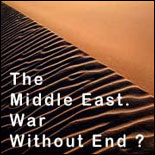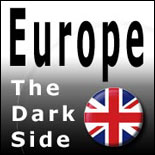|
British
National
Party
Anti-Jihad News Bulletin w/c July 23rd, 2007
Subscribe to this and other BNP
News Bulletins here http://www.bnp.org.uk/mailing_list.htm
No sign up required, just give your email address, that's
all.
1. MAN JAILED OVER 'BIBLE' RAPE
IN AUSTRALIA
http://www.news.com.au/story/0,23599,21911631-2,00.html
A man who raped a Muslim woman because she showed an interest
in Christianity has been jailed for at least five years
by a Sydney court. As Abdul Reda Al-Shawany was sentenced
today, the Downing Centre District Court heard a harrowing
statement from the victim, revealing that her shame and
fear had been compounded by her cultural background. The
woman, who cannot be named, arrived in Australia as a refugee
from Iraq. But she said that even when she was jailed by
dictator Saddam Hussein, she never feared for her life the
way she did after the rape. "It is better if I'm dead,"
she told the court. Al-Shawany's trial was told that he
visited the woman, an acquaintance, at Sydney's Villawood
Detention Centre with another man. The woman had been reading
the Bible and Al-Shawany noted her contact with Christians.
The men told her they were "infidel people" and
if she went with them, her killing "would be halal"
- meaning her killer would go to heaven. In September 2002,
Al-Shawany lured the woman to a unit at Warwick Farm, claiming
to have news about her family in Iraq. She was hit on the
head and had her hijab tied around her face before Al-Shawany
raped her twice in what Judge Brian Knox described as a
degrading, humiliating and brutal attack. Afterwards Al-Shawany
told her: "Let your Christ benefit you now".
It took the jury less than half an hour to convict him of
two counts of sexual intercourse without consent. His victim
- who has since converted to Christianity - wept at the
back of the court as a friend read out her victim impact
statement. She said she was afraid she would be killed,
either in retribution by Al-Shawany's family or in an "honour
killing". "In Iraq, if some woman has got a problem
like this, her husband can kill her, or her brother or her
uncle can kill her, without question," the victim wrote.
"They can kill me here too in Australia. Before I'm
not afraid of anyone. Even when Saddam Hussein put me in
jail, I was still strong. "Now I'm afraid all the time."
She said her husband had refused to speak to her for months
because of the shame she brought on the family. She had
grown isolated within the Iraqi community and feared people
"will say I'm a bad woman". "I feel like
a piece of dirt," she wrote. "I came to Australia
for freedom and Abdul Reda took my freedom away." Al-Shawany,
a father of four, maintains his innocence. Judge Knox found
the offender believed the sexual assault was justified because
the woman was considered an "infidel" for reading
the Bible and associating with Christians. "What he
did was an attempt to enforce his religious or cultural
views on his former countrywoman," Judge Knox said.
"Such behaviour is completely intolerable and totally
unacceptable in this community." He sentenced Al-Shawany
to a maximum seven-and-a-half years in jail. The 52-year-old
must serve at least five years, making him eligible for
parole in 2012.
2. MALAYSIAN WOMAN FACES JAIL
IF SHE DOES NOT RE-CONVERT TO ISLAM
http://www.ekklesia.co.uk/node/5340
A Malaysian woman who converted to Christianity might be
jailed for apostasy, or the rejection of her religion, after
the Muslim-majority country's highest court ruled that she
does not have a constitutional right to convert from Islam
to another religion - writes Michele Green. Lina Joy has
battled for seven years to have her conversion recognised
as legal. She finally took her case to a Malaysian Federal
Court, which decided in a 2-1 majority decision on 30 May
that she could not remove "Islam" from the religion
category of her government identity card despite her conversion
to Christianity in 1998. "She cannot simply at her
own whims enter or leave her religion. She must follow rules,"
said Chief Justice Ahmad Fairuz Sheikh Abdul Halim. "Apostasy
is a matter linked to Islamic laws … civil courts cannot
interfere." The court ruling means Joy, who is believed
to be in hiding and did not appear at court, will have to
take her case to an Islamic, or Sharia, court which has
the jurisdiction to impose prison sentences on those it
finds guilt of apostasy. It was also a major setback to
her hopes of marrying the Christian man she loves.
The landmark ruling tested Malaysia's claims to offer freedom
of religion to its diverse population which is 60 percent
Muslim but also includes Buddhists, Christians, Hindus and
other faiths. Islam is Malaysia's official religion. "This
decision reflects a growing trend of decisions in the courts
where civil courts are abdicating their responsibility of
providing legal redress to individuals who only seek to
profess and live their religion according to their conscience,"
said Roman Catholic Bishop Paul Tan Chee Ing, chairperson
of the Christian Federation of Malaysia Judge Richard Malanjum,
the only non-Muslim on the panel, voted against the decision,
saying it was "unreasonable" to Joy her to turn
to the Islamic court because it could lead to her being
convicted of apostasy. The case was the latest in a series
of legal disputes that have raised questions about the country's
freedom of religion. They include several high profile custody
disputes of children born to parents of different religions
as well as burials - including the case of an army officer
who was buried as a Muslim despite protests from his Hindu
wife. "Freedom of religion here is an illusion,"
said Leonard Teoh, a lawyer for the Malaysian Consultative
Council of Buddhism, Christianity, Hinduism, Sikhism and
Taoism.
3. EGYPT: MOBS ATTACK CHURCHES
NEAR ALEXANDRIA
http://www.compassdirect.org/en/display.php?page=
news&lang=en&length=long&idelement=4905&backpage=
Muslim rioters attacked two Coptic Orthodox churches, damaged
Christian-owned shops and injured seven Christians in two
unrelated incidents in northern Egypt during the past week,
local Christians said. Witnesses said that a mob in Zawyet
Abdel-Qader, 20 miles west of Alexandria, had freely vandalized
the town’s Christian quarter for 90 minutes the night
of June 8 before police intervened. In a second incident
in Dekheila, six miles west of Alexandria, police immediately
halted a mob attack on the Church of the Holy Virgin on
Tuesday night (June 12), preventing all but minimal damage
from occurring. Local Christians confirmed that each attack
was triggered by a fight between a Muslim and a Christian,
but Akram Anwar Bekheed, a local member of the National
Democratic Party in Zawyet Abdel-Qader, laid partial responsibility
on the government. Bekheed said that the government had
created a permissive atmosphere for sectarian violence by
allowing previous attacks on churches to go unpunished in
the interest of keeping peace. In April 2006, Alexandria
was the scene of three knife attacks on churches that killed
one Christian and left a dozen more injured.
The government appeared unable or unwilling to halt subsequent
vandalism of Coptic-owned shops and churches, blaming the
initial attacks on a man they said was mentally unstable.
In a more recent incident in January, local sources said
that violent Muslims had attacked a church-owned social
services building in southern Zawyet Abdel-Qader, damaging
the doors and windows. Hours later, police oversaw the bull-dozing
of the building, despite the fact that the church had obtained
a permit from Alexandria’s governor. Local Christians
in Zawyet Abdel-Qader said that last week’s attack
followed a June 7 argument between a Christian truck driver
and a Muslim teenager who refused to move out of his truck’s
path on a narrow street. Both young men’s fathers became
involved in the fight, and police eventually arrested the
four men. Eyewitnesses said that on June 8, after mid-day
prayers, Muslim worshippers exiting the mosque began congregating
at local coffee shops. “We felt that there was some
sort of conspiracy, and we couldn’t understand what
it was,” local Christians told visitors to Zawyet Abdel-Qader.
They said that men from outside the town arrived at the
coffee shops carrying large bags, which they said they later
found out contained swords, daggers and flammable material.
At 9:45 p.m. the Muslims marched to the Christian quarter
of town, where they began attacking Christian homes and
shops. Local Copts attempted to defend their property, seven
of them sustaining injuries during the fighting.
Mariam Adel, 24, suffered burns from an acid solution while
grocery store owner Yasser Agaibi received stab wounds to
his head, face and back and had to be hospitalized. A poultry
and fish shop owned by Abdel Messih Sidqy and a bakery co-owned
by Khairi Rizq and William Butros also sustained damage.
“They broke glass and windows and looted the shops,”
one source told Compass in the wake of the attack. A telephone
calling center owned by Nashat Mitiass was badly damaged
in the attack. “My losses amount to approximately 40,000
Egyptian pounds [LE],” he told visitors to the town.
“Considering it’s a very poor neighborhood, 40,000
LE is like a fortune,” one Copt commented to Compass.
“Here they can’t get loans from banks and his
place was not insured.” The mob had just turned its
efforts toward the St. Mary and St. Mercurius Church when
law enforcement arrived and halted the violence. The church
sustained relatively little damage. “Zawyet Abdel-Qadir
is an informal settlement that grew up around the railway
line,” one Egyptian observer told Compass. “There
is not much law enforcement there and there are a lot of
Islamists.” Police reportedly detained eight Muslims
and 10 Christians at the Amriya police station, though no
further details were available.
Street Violence
Four days later, on Tuesday (June 12) at 9 p.m., tension
flared between 16-year-old Christian Bassem Mikail and 21-year-old
Muslim Abdel-Dayem, both construction workers, directly
in front of Dekheila’s Holy Virgin church. The conflict
escalated into a street fight between local Muslims and
Christians, and the Muslims launched an attack on the nearby
church, throwing bottles and stones. A church guard quickly
closed the church gates and called police, who immediately
arrived and surrounded the church, quelling all violence.
According to Christian members of the ruling National Democratic
Party (NDP), police arrested 15 Copts and seven Muslims.
Compass sources said that four Christians were referred
to the state prosecutor, who charged them with assault.
No charges have been brought against the other 11, who remain
in detention. The source also said that three charges of
assault, destruction and inciting people to destruction
have been brought against the seven Muslims, one of whom
is the imam (Muslim cleric) of a mosque next to the church.
Attacks against Egyptian Christians have been on the rise
in recent months. In May, Muslims in the town of Bemha attacked
Christian homes after hearing a rumor that the community
was building a new church. According to Coptic editor and
columnist Youssef Sidhom, sectarian violence will continue
to erupt in Egypt as long as underlying issues remain unaddressed.
“Fanatic thought, the culture of rejection of the other,
and the curtailed freedom of worship, if left unchecked,
constitute a time bomb that can go off any minute,”
Sidhom stated in his June 10 column in Coptic weekly Watani.
Coptic Christians are estimated to make up 8 to 15 percent
of Egypt’s population. The majority of these belong
to the Coptic Orthodox Church.
4. CHRISTIANS IN GAZA STRIP WARNED:
ACCEPT ISLAMIC LAW
http://www.worldnetdaily.com/news/article.asp?ARTICLE_ID=56241
Christians can continue living safely in the Gaza Strip
only if they accept Islamic law, including a ban on alcohol
and on women roaming publicly without proper head coverings,
an Islamist militant leader in Gaza told WND in an exclusive
interview. The militant leader said Christians in Gaza who
engage in "missionary activity" will be "dealt
with harshly." The threats come two days after a church
and Christian school in Gaza was attacked following the
seizure of power in the territory by the Hamas terror group.
"I expect our Christian neighbors to understand the
new Hamas rule means real changes. They must be ready for
Islamic rule if they want to live in peace in Gaza,"
said Sheik Abu Saqer, leader of Jihadia Salafiya, an Islamic
outreach movement that recently announced the opening of
a "military wing" to enforce Muslim law in Gaza.
Jihadia Salafiya is suspected of attacking a United Nations
school in Gaza last month, after the school allowed boys
and girls to participate in the same sporting event.
One person was killed in that attack. "The situation
has now changed 180 degrees in Gaza," said Abu Saqer,
speaking from Gaza yesterday. "Jihadia Salafiya and
other Islamic movements will ensure Christian schools and
institutions show publicly what they are teaching to be
sure they are not carrying out missionary activity. No more
alcohol on the streets. All women, including non-Muslims,
need to understand they must be covered at all times while
in public," Abu Asqer told WND. "Also the activities
of Internet cafes, pool halls and bars must be stopped,"
he said. "If it goes on, we'll attack these things
very harshly." Abu Saqer accused the leadership of
the Gaza Christian community of "proselytizing and
trying to convert Muslims with funding from American evangelicals."
"This missionary activity is endangering the entire
Christian community in Gaza," he said. Abu Saqer claimed
there was "no need" for the thousands of Christians
in Gaza to maintain a large number of institutions in the
territory. About 2,000 Christians live in the Gaza Strip,
which has a population of over 1 million. Abu Saqer said
Hamas "must work to impose an Islamic rule or it will
lose the authority it has and the will of the people."
His comments come after gunmen Sunday attacked Gaza's Latin
Church and adjacent Rosary Sisters School, reportedly destroying
crosses, bibles, pictures of Jesus and furniture and equipment.
The attackers also stole a number of computers. The attack
was the first targeting of Christian institutions since
Hamas last week staged a coup against the rival Fatah party
of Palestinian Authority President Mahmoud Abbas, seizing
all Fatah positions and security compounds, essentially
taking complete control of the Gaza Strip. Hamas officials
in Gaza claimed to WND Fatah was behind Sunday's church
attack in an attempt to discredit Hamas to the international
community. Abu Saqer claimed he had "good information"
the attack actually was a robbery aimed at the church's
school computers, even though Bibles and Christian holy
objects were destroyed.
Christians, secular institutions
targeted
Israel evacuated the Gaza Strip in 2005. Since then, there
have been a slew of attacks there against Christians and
non-Muslims. A month before the U.N. school was targeted,
Palestinians bombed a Christian book store in Gaza reportedly
funded by American Protestants that exclusively sold Christian
books. Two nearby Internet cafes also were bombed. At the
time, Abu Saqer, who didn't take credit for the attack,
told WND the Christian bookstore was "proselytizing
and attempting to convert our people." "As a principle,
we believe that Jews and Christians will always do everything
in order to keep Muslims far from their religion,"
Abu Saqer said. Even before Hamas took over Gaza last week,
some analysts here called the recent bombings of secular
and Christian institutions in the territory indications
Hamas may be seeking to impose Islamic rule on the Palestinian
population. Israeli officials said Hamas in 2005 established
hard-line Islamic courts and created the Hamas Anti-Corruption
Group, described as a kind of "morality police"
operating within Hamas' organization. Hamas has denied the
existence of the group, but it recently carried out a high-profile
"honor killing" widely covered by the Palestinian
media. A Hamas-run council in the West Bank came under international
criticism last year when it barred an open-air music and
dance festival, declaring it was against Islam.
'West can learn from Islamic values'
In response to the uproar, Hamas chief in Gaza and former
foreign minister Mahmoud al-Zahar told WND in a recent interview:
"I hardly understand the point of view of the West
concerning these issues. The West brought all this freedom
to its people but it is that freedom that has brought about
the death of morality in the West. It's what led to phenomena
like homosexuality, homelessness and AIDS." Asked if
Hamas is seeking to impose hard-line Islamic law on the
Palestinians, al-Zahar responded, "The Palestinian
people are Muslim people, and we do not need to impose anything
on our people because they are already committed to their
faith and religion. People are free to choose their way
of life, their way of dress and behavior." Al-Zahar
said his terror group, which demands strict dress codes
for females, respects women's rights. "It is wrong
to think that in our Islamic society there is a lack of
rights for women. Women enjoy their rights. What we have,
unlike the West, is that young women cannot be with men
and have relations outside marriage. Sometimes with tens
of men. This causes the destruction of the family institution
and the fact that many kids come to the world without knowing
who are their fathers or who are their mothers. This is
not a modern and progressed society," al-Zahar explained.
The terror chieftain told WND the West can learn from his
group's Islamic values. "Here I refer to what was said
in the early '90s by Britain's Prince Charles at Oxford
University. He spoke about Islam and its important role
in morality and culture. He said the West must learn from
Islam how to bring up children properly and to teach them
the right values."
5. DENMARK: ISLAMISTS SEIZE POWER
IN KINDERGARTEN
http://www.westernresistance.com/blog/archives/003789.html
Men from Hizb ut-Tahir have seized power in a privately
owned kindergarten in the Narrebro district of Copenhagen.
They demand that children are not taught democratic values.
The authorities threaten to close the institution down.
The municipal administration of Copenhagen has under dramatic
circumstances taken over the administration of the institution
and threatens to close it down, according to a report in
the Danis newspaper 'Berlingske Tidende' This unusual step
has been taken after parents and members of the Islamistic
party Hizb ut-Tahir earlier this year have gained majority
in the governing board and taken control over the institution
named Salam, and demand that the children are not taught
according to democratic values. The parents have also demanded
segregation, different playground for boys and girls. Last
year, furious parents demanded the destruction of Christmas
related items the children had picked up at a visit to the
zoo, claiming the Santa Claus headgear represent Christian
values.
In February, after Hizb ut-Tahir gained the upper hand in
the board, the leader of the institution quit her job together
with another pedagogue. The institution is now lead by a
team of 6 believing Muslim women, which has lead the auditors
of the municipality of Copenhagen to raise the alarm. The
municipality has now taken direct control over the place
until a new leadership has been appointed. "It is unquestionably
the tension between what is called pious or fundamentalistic
Islam and traditional Danish democratic thought that is
at the core of this conflict. The municipality has on other
occasions experienced conflicts in its institutions, also
religious conflicts, but never has the tension been as high
as now", says Jan Dehn of 'Children and Youth office'.
One of the leading members of the parents group, the convert
Abdul Hamid Henrik Lund, confirms his connection with Hizb
ut-Tahir: "All the parents are what the Danes will
call fanatics. We are Muslims and determined that 'the brain
of our children get the right programming' (sic). We don't
want them to 'run about on Blagards Plads (a square in Copenhagen),
behaving like monkeys' (sic). Those children cause trouble
because they have neither Danish nor Muslim roots. To us
it is important that children grow up with values - they
must know what is halal and haram."
6. MONTREAL MAN KILLED BY HIS
BROTHER FOR BEING A BAD MUSLIM
http://www.jihadwatch.org/archives/016801.php
When a society imports large numbers of people from a culture
that tolerates this kind of murder of the religiously deviant,
or at very least from countries in which many people believe
that if El-Mehdi really was a bad Muslim, then he deserved
everything he got, then no one should be surprised when
this kind of thing happens in the new land. No one dares
address the idea that it is permissible to murder apostates
in Islam. No one would dare require immigrants to renounce
this idea. No one would dare require mosques to hold programs
teaching against this idea, and other Sharia provisions,
if they want to stay in the West. No, they're imported wholesale,
with no consideration of the ramifications. Since none of
the high-profile Muslim groups in the U.S. have declared
the execution of apostates, as sanctioned by Islamic law,
to be impermissible and wrong in all circumstances today,
and none have renounced jihad warfare against unbelievers
in order ultimately to subjugate them, is that really a
wise course to take? Jihad Watch reader Marc has kindly
sent in this translation of this French article,
|








